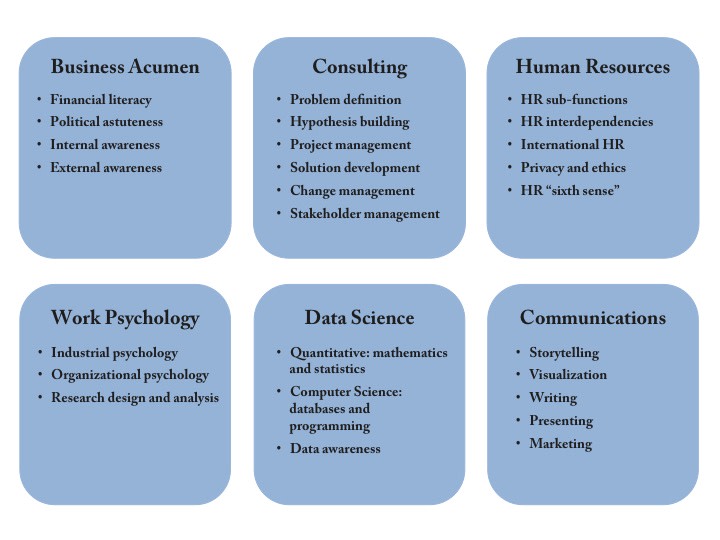6 Skills for People Analytics Success
HR strategy and workforce analytics expert Jonathan Ferrar presents six skills for people analytics success.

Jonathan Ferrar is a respected consultant, speaker, and author in HR strategy, workforce analytics, and the Future of Work. This article is adapted from his book, The Power of People: Learn How Successful Organisations Use Workforce Analytics To Improve Business Performance, and originally appeared on his LinkedIn Pulse. He presents six skills for people analytics success.
The leader of any workforce analytics team has one of the most exciting and demanding jobs in the business—and especially in the Human Resources function. They’re expected to act with the rigour of a management scientist in a top university, yet at the speed of change expected by the Chief Executive Officer. While professors can take years to come to a firm conclusion based on analyses, analytics leaders work to the rhythm of a dynamic business environment.
The analytics leader is expected to make decisions based on evidence, but the evidence usually reveals they’re making decisions in the face of great uncertainty. To cap it all off, the consequences of their actions can affect the lives of hundreds, sometimes even thousands of workers. This requires incredible perspective and judgment.
But even for the most capable of workforce analytics leaders, analytics is a team pursuit. When the requirements of a workforce analytics project reach a scale of any note, the demands are simply too varied and too great for one person to meet.
So, who should an analytics leader appoint in their team to help deliver the work?
During the research for our book and after interviewing 60 practitioners, leaders and academics we believe there are six distinct categories of skills that make for successful workforce and people analytics.
The six skills for success

1. Business acumen
Business acumen refers to quickness and ability at interpreting and resolving business challenges. It’s great if everyone in the team has some degree of business acumen, but it’s especially important in the leader. In the figure are listed the sub-skills that fall under this category; financial literacy, political astuteness, internal (organizational) awareness and external (marketplace) awareness.
2. Consulting skills
Consulting skills repeatedly arose in discussions with analytics directors about the skills most needed for success. Digging deeper revealed that when these experts were discussing consulting skills, they were referring to the ability to clearly define problems, create hypotheses about the causes of problems, propose solutions, and manage the organizational change process while keeping stakeholders satisfied and the project on track.
3. Human resources
The workforce analytics leader often came from a background other than HR, but someone in the team always had deep HR experience. This was usually in either one of the functional specializations of HR (such as recruitment or learning), HR strategy, or international human resources. These people often have a sixth sense for what is right and wrong when it comes to decision-making about people. Make sure you have these skills on your team!
4. Work psychology
Work psychologists bring the science to the analytics in HR. Industrial psychologists have a deep understanding of the causes of common individual level performance issues. Organisational psychologists focus on team and business unit productivity. Work psychologists can save you years of work (this is no exaggeration) investigating the causes of common HR problems, just by simply telling you what the scientific literature says about the causes of common HR issues.
5. Data science
Data science in workforce analytics describes two broad skill sets. The first set of skills is quantitative, and refers to the ability to build mathematical and statistical models of organizational processes like attrition. The second broad area is computer science. These skills involve managing databases and programming. People with these skills are the data experts, those who can extract the data from multiple systems and shape it into a structure suited for analysis by your mathematicians and statisticians.
6. Communications
The best analyses in HR analytics fall flat when they are not communicated well. We were advised time and again that successful projects tended to have a common denominator—they were all well communicated. Communication skills should be a requirement from everyone in the team. You should look to ensure at least one person has a strength in areas including storytelling, visualization, presenting, writing, and marketing. If necessary, you may decide to look for an external communications expert.
Summary
In summary, workforce analytics projects present challenges that are best met with a team with diverse skills. Our research suggests that the Six Skills for Success cover the required skills to achieve successful business outcomes.
These skills do not mean you need six people (or multiples of six), nor do you need the people physically employed in your organisation. Other chapters in the book talk about the skills most needed by the leader plus how to get skills from elsewhere in your organisation and how to outsource skills into your team on an ‘as need’ basis from outside your company.
Image has been republished with permission from the author.


